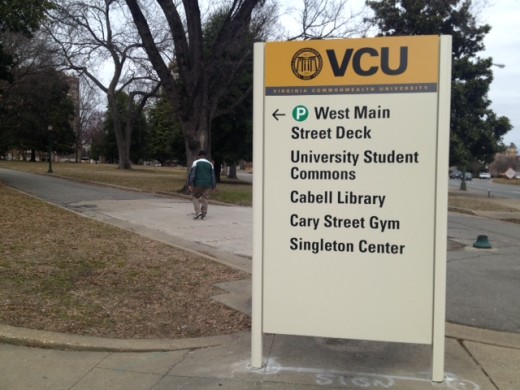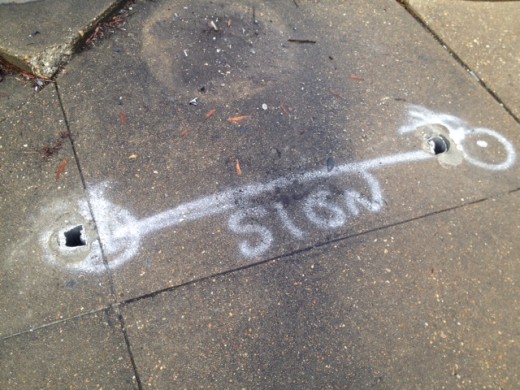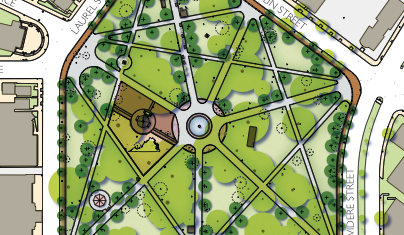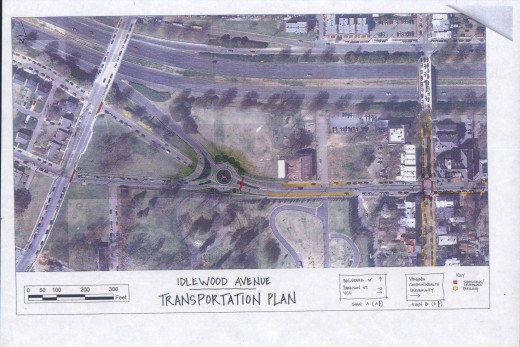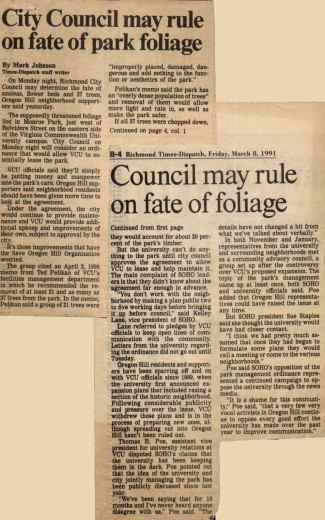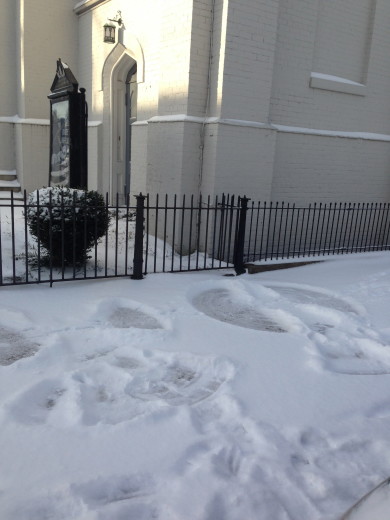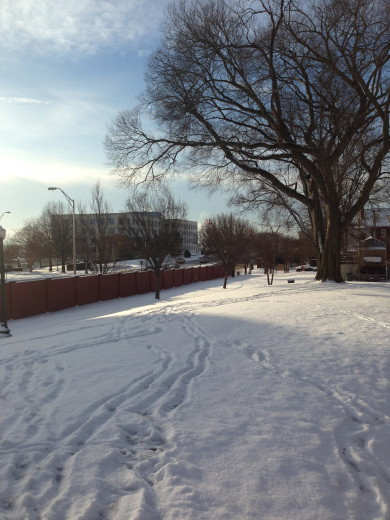Yesterday, City Council’s Land Use Committee voted unanimously to recommend approval of a plan to lease Monroe Park, one of the oldest public parks in the country and the oldest in Richmond, to the Monroe Park Conservancy, a private, nonprofit group, despite much public opposition.
Category Archives: parks
Special Planning Commission Meeting/Monroe Park Bids
Keeping up with our local government:
The City Planning Commission will hold a special meeting on Thursday, March 13, 2014, at 10:00 am to receive a presentation on the Mayor’s Capital Improvement Plan for FY15-FY19. Although some neighbors wanted to speak at the meeting in support of Councilman Parker Agelasto’s CIP budget request for rewatering the James River and Kanawha Canal, there is no public hearing at this meeting and the public will not be allowed to speak. The full budget is referred to Council and its committees. Once that occurs, public hearings with time for public comment will be scheduled both at the committee level and the full Council level.
Also,
A request for bids is in the Classified legal section of today’s Times Dispatch newspaper for the Monroe Park lease. A term of 30 years is advertised. Bids to be received by 5:00 pm on Monday March 24 and presented to City Council at 6:00 pm on March 24.
Venture Richmond and Taxes and Leases…
Oregon Hill neighbors continue to investigate the private, non-profit Venture Richmond. What they are finding may be of interest to all Richmond citizens.
Venture Richmond is (allegedly) leasing the city property at Brown’s Island and the city property at ‘Tredegar Green’ each for $1/ year. The wording of the lease obligates Venture Richmond to pay to the city an amount equal to the city real estate taxes unless exempted. Even if exempted, Venture Richmond is obligated to pay to the city the city real estate taxes that would accrue by any sub-lessee, such as an entity sub-leasing the canal boat concession.
The city’s Finance Department has confirmed that they have no documents relating to the payment of these real estate taxes by Venture Richmond for the Brown’s Island or Tredegar Green leases nor do they have any documents relating to an exemption. The Finance Department has been in contact with the City Attorney on the issue. The real estate taxes for Brown’s Island alone would be over $70,000 per year. This appears to be similar to the situation encountered with the Redskins Training Camp deal:
This comes at the same time that Venture Richmond has applied to City Council for an exemption from real estate taxes for the property owned by Venture Richmond at Tredegar Green. The catch is that Venture Richmond is making this application for exemption during a moratorium on exemptions by designation. They are in fact seeking an exemption from the moratorium on exemptions. The assessor’s committee that examined Venture Richmond’s application for exemption unanimously rejected the application over a year ago, citing, among other issues, the high salary of Venture Richmond employees. Collectively the top four employees of Venture Richmond make over $640,000 annually.
It is even questionable if Venture Richmond has a valid lease on the city Tredegar Green property. State code requires that any city lease with a term of five years or more to be put up for bids. The City Clerk could provide no documentation that the Tredegar Green lease, which is for a term of over five years in length, was ever advertised for bids (in the same vein as the recent Monroe Park situation).
This is all coming to a head next Monday, March 17, 2014, when Venture Richmond’s proposed Tredegar Green amphitheater, which would do great damage to the historic James River and Kanawha Canal, is on the agenda of the Richmond City Planning Commission. The Planning Commission is supposed to review Venture Richmond’s lease of the Tredegar Green property, when it appears that this lease may not be valid. Equally strange would be for the Planning Commission to consider this item if Venture Richmond has not honored its (alleged) lease by paying the real estate taxes or by showing an exemption.
The Oregon Hill Neighborhood Association (OHNA) has asked that the City Planning Commission exclude the city property above the canal from Venture Richmond’s proposed amphitheater because that property is not zoned for an amphitheater. OHNA also points out that the city Tredegar Green property will be the logical location for the eastern terminus of the canal when the canal is rewatered. If the property above the canal is removed from the proposed amphitheater there would be no cause to damage the historic canal.
VCU Sign Saga Continues
They put this controversial sign back in. Rumor is the previous one got hit by a car.
Monroe Park VCU Sign Removed (Again)
This is all that’s left, after all the earlier controversy (see here, here, here, here, and here.
There is speculation that this is in anticipation of more controversy in regard to Monroe Park.
City Council’s Land Use Committee will hear the presentation for the proposed Monroe Park lease on Tuesday, in Council chambers in City Hall at 3PM.
Since the proposed Monroe Park lease is for more than 5 years, according to City code, it must be advertised for bids 2 weeks before going to City Council for vote. It is scheduled for Council on February 24 yet no ads have been out. A FOIA request by a neighbor revealed the ads would run on Feb 27, 3 days after it was scheduled for a vote. It’s unclear how this will be resolved.
The 5th district meeting that was cancelled on Feb. 12 due to inclement weather has been rescheduled for Feb 20th. The proposed Monroe Park lease plan will be presented then- 6:30 at the Byrd Park roundhouse.
Community Discussions On Monroe Park and Idlewood Traffic Tomorrow Evening
If you didn’t catch Friday’s Open Source RVA on 97.3 FM and http://wrir.org/, check out the podcast! Oregon Hill neighbor Charles Woodson of the Monroe Park Advisory Council talks about a controversial lease agreement that would give Richmond’s oldest park over to a private conservancy.
This should be required listening prior to attending the “Community Conversation” happening tomorrow evening at 6 pm at the Nile.
Join us as we collaborate with Richmond Magazine, TMI Consulting Inc., the Future of Richmond’s Past and local restaurants to offer our next series of “Community Conversations.” Each month we will discuss a locale in the city spanning from Shockoe Bottom to the Boulevard. Attendees will participate in a discussion with Harry Kollatz, Jr., senior writer with Richmond Magazine and author of two books on Richmond history: Richmond Ragtime and True Richmond Stories, who will facilitate a conversation on the significant events and changes that have occured in Monroe Park over time. By the end of the evening attendees will have a comprehensive view of the history of Monroe Park and how it has become the locality that we see today.
I know some neighbors will be missing this due to a conflicting meeting about the Idlewood roundabout project at the Randolph Community Center.
From Councilperson Parker Agelasto’s newsletter:
At 7:30 pm, the City’s Traffic Engineer, Tom Flynn, along with consultants from Kimley-Horn and Associates will meet with a task force of Randolph and Oregon Hill residents to discuss the problems and solutions in crafting a design for the a proposed roundabout along Idlewood Avenue.
The proposed roundabout has been a recommendation of the City Traffic Engineer with the City for about 10 years and was codified in the long-range Richmond Connects Multimodal Transportation Plan. In 2012, this had a series of public work sessions to make recommendations and included several modifications in March 2013 before being finalized in July 2013. The complete document is available at www.yesrichmondva.com/sites/default/files/documents/RichmondConnects.pdf.
The roundabout project was spearheaded by a coalition from Oregon Hill, William Byrd Community House, Byrd House Market, St. Andrew’s School, St. Andrew’s Church, and VCU. Due to the nature of the Downtown Expressway exit ramp and the traffic intersection at S. Cherry Street, this section of Idlewood Avenue is dangerous and poses a safety concern. VCU offered to contribute half of the cost of the project if the City contributed the remainder. These funds are currently in the budget and the City leveraged its share to receive matching funds from the State (meaning the City’s cost is only 1/4 of the entire project). That said, the concept is fully funded and a consultant has been hired to begin the design process with public input.
“City Council may rule on fate of park foliage”
On March 8, 1991, an article appeared in the Times-Dispatch.
The article was about how VCU was trying to get control of the maintenance of Monroe Park and had a plan to cut down 37 of the mature trees. VCU said that the trees were “improperly placed, damaged, dangerous and add nothing to the function or aesthetics of the park,” and stated that removal of the trees would, “make the park safer.”
Fortunately this maintenance agreement was not approved in 1991 because of neighborhood objections, but if the newly proposed lease is approved, VCU would be in charge of the maintenance of the trees and would be given carte blanche to remove as many trees as it wanted without any recourse. Most of the trees that were slated to be removed in 1991 are still in the park, and there is no reason to think that VCU would not again want them removed, “to make the park safer.”
As a result of VCU’s attempt to remove 20% of the mature trees in Monroe Park in 1991, the Monroe Park Advisory Council was established with neighborhood representation from Oregon Hill, the Fan, and Carver. The proposed Monroe Park Conservancy has NO neighborhood representation, but includes four VCU administrators, and four city administrators.
Winter Wonder From This Morning
The snow from last night made Oregon Hill into a winter wonderland this morning.
Snow angels outside Pine Street Baptist Church:
Wintery Parsons Linear Park overlooked Belvidere Street:
Monroe Park Lease Proposal
Click here to download a Monroe Park Ordinance and Lease.
This will most likely not get voted on by City Council anytime soon. But it could provide an interesting discussion point at the ‘Community Conversation on Monroe Park’ next Tuesday at the Nile Restaurant.
As one neighbor remarked,
This lease is a pretty outrageous document! I am just flabbergasted that the City Council would consider such an arrangement:
The Mayor is given the authority to appoint one-third of the board, and the administration is given the authority to approve any changes to the planned improvements.
The Tenant (Monroe Park Conservancy) pays only $1 annual rent, and pays no real estate taxes.
The Tenant shall establish polices of the use of the park, subject to approval of Richmond’s Chief Administrative Officer.The Landlord (the City) pays for any damages to the park.
The Landlord, with VCU, pays for all police and security.
The Landlord at no charge supplies all gas, water, electricity, sewer, and storm water expenses.
The Landlord is responsible for repairing and replacing all structural elements.
City Schedules Three Land Use Meetings on Same Day (TOMORROW!)
With a nod to the City Hall Review:
City of Richmond
January 21, 2014
1:30pm – Planning Commission Meeting
3:00pm – Land Use Standing Committee Meeting
7:00pm – Richmond Riverfront Plan Projects Public Forum
Also, from Fans of Monroe Park Facebook Page:
On Tuesday, January 21, 2014, Alice Massie, president of the Monroe Park Conservancy, will make a presentation to Richmond’s Land Use Committee at 3PM. This is the first step in turning the park over to this private entity. There is a public comment period. This will take place at city Hall, 2nd floor council chambers.
Click here for previous post on Monroe Park privatization.
Also note how the Riverfront Plan Public Forum will happen AFTER Venture Richmond’s Tredegar Green amphitheater plan goes to the Planning Commission.

